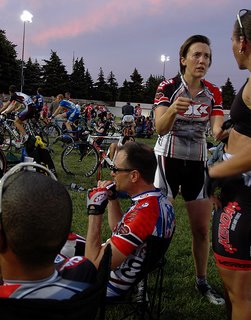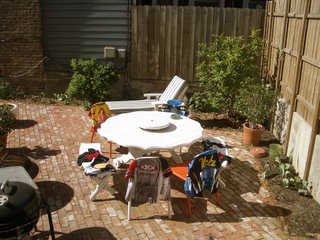Today the Trib (6/1/06) reports that, in classic Chicago political machine style, a former top official in Streets and Sanitation has admitted to recruiting 300 "white ethnic" campaign workers for Daley and pro-Daley candidates. They were promised city jobs, mostly blue collar, unionized jobs in Streets and Sanitation, in exchange for registering voters and campaigning across the city and suburbs.
This seems like a throwback to an early era of machine politics. But not only is patronage alive and well in Chicago, so too do the pipelines continue to flow along racial and ethnic lines, just as they did in the past. This particular group was reportedly founded to "complement" similar political organizations like the Hispanic Democratic Organization (HDO), which has been the primary Latino vehicle for registering voters, securing city jobs, and getting Daley-backed Latino candidates elected. Similar operations connect African-Americans to the political machine.
Some people see this as evidence of equality—whites, blacks and Latinos all have their own patronage connections, so nobody’s left out! The CEO of the United Neighborhood Organization (UNO), a group closely tied to my alderman here in the Pilsen neighborhood (the 25th ward's Danny Solis) and to the HDO, wrote an op-ed in January arguing that the HDO represents merely the latest in a series of groups--the Irish, the Poles, African-Americans—who have built political power through patronage in Chicago. He goes so far as to celebrate this as "political empowerment in its purest form" (Chicago Tribune 1/17/06). He quite correctly points out that through the work of the HDO, more Latinos have been elected to public office, appointed to influential positions, and gained access to city jobs. If this was once the path to upward mobility for the Irish, he argues, why shouldn't Latinos follow it today?
Of course, the question remains as to whether having more members of a group in positions of authority translates to having the "interests" of "the community" represented in civic life. Historically in Chicago, patronage has been antithetical to grass-roots participation. Black aldermen loyal to the first mayor Daley effectively turned a blind eye to disinvestment in their communities in exchange for patronage. The mayor was insulated from the participation of neighborhood groups and his policies promoted loop-centered development.
The current administration seems to operate in a similar style. In Pilsen, a predominately working-class Mexican neighborhood embattled by surrounding development and gentrification, the HDO and the alderman, a leading HDO member, are accused of paying insufficient attention to the concerns of "the community" as they adhere to a pro-development agenda. Grass-roots organizers and the alderman regularly toss back and forth conflicting definitions of "the community" and its interests as they battle over affordable housing, zoning, education, and the proper use of tax money in Pilsen.
Two recent issues illustrate this contest over "community". First, as part of its efforts to combat gentrification, in the March 21, 2006 elections, the grass-roots group Pilsen Alliance placed a down-zoning referendum on the ballot. The idea behind the “advisory” (i.e. nonbinding) referendum was to demonstrate support for a zoning ordinance that would prevent the conversion of single-family homes to condominiums, thus eliminating the huge potential for developers and “flippers” to profit from multi-unit condo development. This was seen as a way to slow the inflation of real estate values in Pilsen and perhaps the increase in rents and consequent displacement among a community that is composed primarily of low to middle-income Mexican renters. Moreover, by requiring future zoning decisions to be made on a case-by-case basis, they hoped to bring wider input into the process and perhaps to balance new development with set-asides for affordable housing or other benefits for current residents. The referendum passed with 75% of the vote. The organizers of the referendum called alderman Solis to a meeting last week to force him to “listen to the community” and support the ordinance. The alderman, however, sent a spokesperson in his place. The latter read a disparaging letter that rejected the proposed ordinance while denouncing the referendum and its sponsoring organization as attempting to confuse and “manipulate the community.”
Second, public school teachers in Pilsen recently protested the granting of a charter to a new school run by UNO, closely tied to the HDO. UNO promoted the school as offering another option for community residents. The sentiment among protesters, however, was that the new school was intended to make Pilsen a more attractive neighborhood for new middle-class residents, not for those already living there: “Just because we won’t be paying $2000 a month for a condo doesn’t mean we don’t deserve good schools,” declared one speaker. Opponents argued that the process through which the charter was granted was not open, that there was insufficient “dialogue with the community,” and that the school district administrators had not bothered to investigate whether there was a need for the new school. Teachers emphasized the work being done to improve existing neighborhood schools and questioned whether the charter school would drain resources from these. UNO was criticized for using its political ties to secure a charter school while bypassing local participation in the decision-making process.
So what should we conclude about the relationship between the political representation and political empowerment of a particular group? We sociologists like to put that word “group” in quotes to add a little uncertainty to its very "groupness". That's because group boundaries are often questionable and members may find they have little in common with those purported to represent them. These incidences demonstrate that access by “group” members to city jobs and political influence doesn’t neatly translate into the representation of “group” interests in city life.








